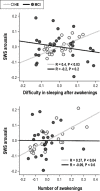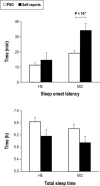Polysomnographic and subjective sleep markers of mild cognitive impairment
- PMID: 23997365
- PMCID: PMC3738041
- DOI: 10.5665/sleep.2956
Polysomnographic and subjective sleep markers of mild cognitive impairment
Abstract
Study objectives: Growing evidence suggests that sleep disturbances precede by years the clinical onset of Alzheimer disease (AD). The goal of the current study is to determine whether changes in polysomnographic (PSG) sleep patterns accompany subjective sleep complaints in patients with mild cognitive impairment (MCI). We further examine whether meaningful changes in objective sleep physiology are predicted by self-reported sleep measures in MCI patients, and whether incipient neurodegeneration contributes to exacerbate sleep misperception.
Design setting and participants: Overnight PSG recordings and self-reported sleep measures were obtained from 25 healthy elderly (HE) subjects and 25 patients with MCI at the sleep laboratory.
Results: Both PSG and self-reported sleep measures confirmed that sleep is altered in patients with MCI. Whereas subjective sleep responses predicted fragmentation of slow wave sleep (SWS) in HE individuals, this relationship was not evident in MCI patients. Furthermore, patients with MCI showed significant discrepancies in the estimation of sleep onset latency when compared with HE subjects.
Conclusions: Sleep is significantly impaired in patients with mild cognitive impairment at both the objective and subjective level, which may be used as a surrogate marker of preclinical Alzheimer disease. Taken together, these findings aid in the development of novel therapeutic strategies devoted to improve sleep in the elderly population at risk of developing Alzheimer disease.
Keywords: Aging; Alzheimer disease; ApoE; mild cognitive impairment; polysomnography; self-reports; sleep; sleep misperception.
Figures


Comment in
-
Disturbed sleep in preclinical cognitive impairment: cause and effect?Sleep. 2013 Sep 1;36(9):1275-6. doi: 10.5665/sleep.2942. Sleep. 2013. PMID: 23997358 Free PMC article. No abstract available.
Similar articles
-
Disturbed sleep patterns in elders with mild cognitive impairment: the role of memory decline and ApoE ε4 genotype.Curr Alzheimer Res. 2012 Mar;9(3):290-7. doi: 10.2174/156720512800107609. Curr Alzheimer Res. 2012. PMID: 22211488
-
Non-rapid eye movement sleep instability in mild cognitive impairment: a pilot study.Sleep Med. 2015 Sep;16(9):1139-45. doi: 10.1016/j.sleep.2015.04.027. Epub 2015 Jun 25. Sleep Med. 2015. PMID: 26298791
-
Circadian misalignment and sleep disruption in mild cognitive impairment.J Alzheimers Dis. 2014;38(4):857-66. doi: 10.3233/JAD-131217. J Alzheimers Dis. 2014. PMID: 24100124
-
Sleep disturbance in mild cognitive impairment: a systematic review of objective measures.Neurol Sci. 2017 Aug;38(8):1363-1371. doi: 10.1007/s10072-017-2975-9. Epub 2017 Apr 28. Neurol Sci. 2017. PMID: 28455768 Review.
-
Sleep-dependent memory consolidation in healthy aging and mild cognitive impairment.Curr Top Behav Neurosci. 2015;25:307-30. doi: 10.1007/7854_2014_300. Curr Top Behav Neurosci. 2015. PMID: 24652608 Review.
Cited by
-
Sleep, Noninvasive Brain Stimulation, and the Aging Brain: Challenges and Opportunities.Ageing Res Rev. 2020 Aug;61:101067. doi: 10.1016/j.arr.2020.101067. Epub 2020 May 4. Ageing Res Rev. 2020. PMID: 32380212 Free PMC article. Review.
-
Chronic Sleep Restriction Induces Cognitive Deficits and Cortical Beta-Amyloid Deposition in Mice via BACE1-Antisense Activation.CNS Neurosci Ther. 2017 Mar;23(3):233-240. doi: 10.1111/cns.12667. Epub 2017 Feb 1. CNS Neurosci Ther. 2017. PMID: 28145081 Free PMC article.
-
Impact of the expert consensus on polypharmacy and potentially inappropriate medication use in elderly lung cancer outpatients with multimorbidity: An interrupted time series analysis, 2016-2021.Front Pharmacol. 2022 Oct 5;13:992394. doi: 10.3389/fphar.2022.992394. eCollection 2022. Front Pharmacol. 2022. PMID: 36278193 Free PMC article.
-
Effects of Six-Month Aerobic Exercise Intervention on Sleep in Healthy Older Adults in the Brain in Motion Study: A Pilot Study.J Alzheimers Dis Rep. 2018 Dec 24;2(1):229-238. doi: 10.3233/ADR-180079. J Alzheimers Dis Rep. 2018. PMID: 30599044 Free PMC article.
-
Circadian disruption and sleep disorders in neurodegeneration.Transl Neurodegener. 2023 Feb 13;12(1):8. doi: 10.1186/s40035-023-00340-6. Transl Neurodegener. 2023. PMID: 36782262 Free PMC article. Review.
References
-
- Prinz PN, Vitiello MV, Raskind MA, Thorpy MJ. Geriatrics: sleep disorders and aging. N Engl J Med. 1990;323:520–6. - PubMed
-
- Hofman MA, Swaab DF. Alterations in circadian rhythmicity of the vasopressin-producing neurons of the human suprachiasmatic nucleus (SCN) with aging. Brain Res. 1994;651:134–42. - PubMed
-
- Espiritu JR. Aging-related sleep changes. Clin Geriatr Med. 2008;24:1–14. - PubMed
-
- Reid KJ, Martinovich Z, Finkel S, et al. Sleep: a marker of physical and mental health in the elderly. Am J Geriatr Psychiatry. 2006;14:860–6. - PubMed
Publication types
MeSH terms
Substances
LinkOut - more resources
Full Text Sources
Other Literature Sources
Medical
Miscellaneous

